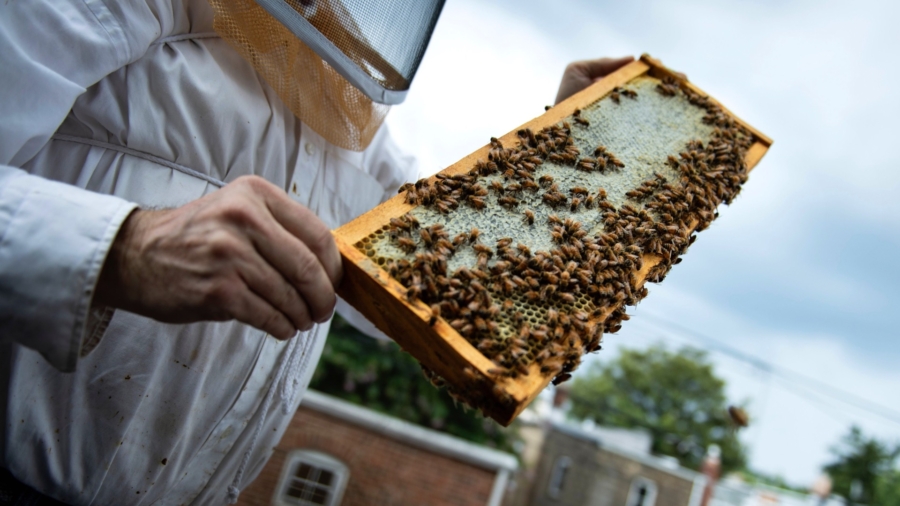The U.S. Department of Agriculture (USDA) has granted conditional use to the world’s first-ever vaccine for honeybees that could prevent colonies from getting infected with American foulbrood, a type of bacterial disease that affects the bee’s larvae.
Dalan Animal Health, the U.S.-based biotech company that developed the vaccine, announced the approval in a Jan. 4 statement.
“We are committed to providing innovative solutions to protect our pollinators and promote sustainable agriculture,” said Annette Kleiser, the company’s chief executive officer, noting that the vaccine is “a breakthrough in protecting honeybees.”
Prior to the vaccine, the fatal bacterial brood disease could not be cured. If a beekeeper noticed one of their colonies was infected with American foulbrood, the infected hive would often be incinerated to prevent the disease from spreading, killing all the bees and equipment. In some Mid-Atlantic states, this practice is mandatory.
Another remedy involves treating the colony with antibiotics.
Bees play a crucial role in biodiversity for humans and animals as pollinators are directly linked to the food production chain. According to the United Nations Environment Program, “of the 100 crop varieties that provide 90 percent of the world’s food, 71 are pollinated by bees.”
In the United States, beekeepers lost an estimated 45.5 percent of their managed honeybee colonies between April 2020 and April 2021, according to a nationwide survey conducted by Bee Informed Partnership.
For the past 30-plus years, the population of pollinators in the United States suffered sharp losses due to invasive pests and diseases.
‘Incorporated Into Royal Jelly’
Unlike traditional vaccines, it isn’t injected via a syringe. Instead, it is administered by mixing it into “queen feed,” which is then consumed by worker bees.
“The vaccine is incorporated into the royal jelly by the worker bees, who then feed it to the queen,” the company stated. “She ingests it, and fragments of the vaccine are deposited in her ovaries. Having been exposed to the vaccine, the developing larvae have immunity as they hatch.”
Honeybees are a critical component of agriculture. A large percentage of the global food supply relies on pollination, and healthy commercial hives are essential to secure high crop yields.
Trevor Tauzer, a board member of the California State Beekeepers Association who also owns Tauzer Apiaries, said in a statement that the USDA issuing a conditional vaccine license is “an exciting step forward for beekeepers.”
“We [beekeepers] rely on antibiotic treatment that has limited effectiveness and requires lots of time and energy to apply to our hives,” Tauzer said. “If we can prevent an infection in our hives, we can avoid costly treatments and focus our energy on other important elements of keeping our bees healthy.”
According to a USDA notice that explains American foulbrood, the disease is “one of the most widespread and the most destructive of the honey bee brood diseases.”
“At first, the population of an infected colony is not noticeably decreased and only a few dead larvae or pupae may be present,” the agency stated. “The disease may not develop to the critical stage where it seriously weakens the colony until the following year, or it may advance rapidly and seriously weaken or kill the colony the first season.”
Although the vaccine was developed by Dalan, it is being manufactured in Iowa by Diamond Animal Health, a wholly-owned subsidiary of the animal healthcare company, Heska.
The vaccine will first be distributed by Dalan on a limited basis to commercial beekeepers, the company said, noting that it anticipates becoming available for purchase nationwide later this year.
Dalan also noted that the vaccine is not genetically modified and can be used in organic agriculture.

